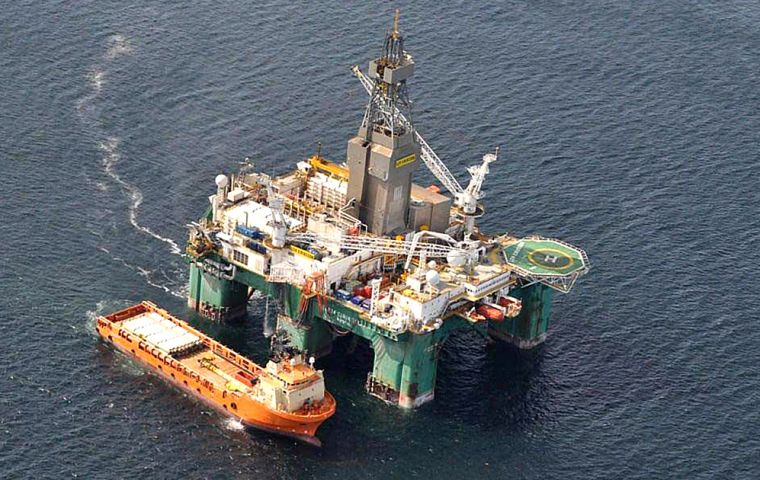MercoPress. South Atlantic News Agency
Falkland Islands lawmakers committed to enable oil production
 When asked about the oil industry, MLA Birmingham said: “It’s a matter for the majority view, personally I can’t get excited about it”
When asked about the oil industry, MLA Birmingham said: “It’s a matter for the majority view, personally I can’t get excited about it”  MLA Biggs said he hates the idea of going into a production state in the Islands, however, “I can see the sense if it’s properly regulated”
MLA Biggs said he hates the idea of going into a production state in the Islands, however, “I can see the sense if it’s properly regulated” Members of the Falkland Islands Legislative Assembly John Birmingham and Pete Biggs have both voiced personal distaste at the concept of oil production in the Falkland Islands, despite an overall commitment in the Islands Plan 2022 to “progress extractive industries in an environmentally conscious way.”
MLA Biggs, asked if he personally supports the idea of the Falklands entering into oil production, said “I rather hate the idea of going into a production state in the Islands, however, I can see the sense if it’s properly regulated.
”Then the environmental impact can be relatively small,” he added.
Asked if he saw a clash between the environmental commitments of the assembly and the goal to make progress with hydrocarbons, MLA Birmingham said “no, because if anything happened the regulations would be as strict and as environmentally friendly as you can possibly get.”
When asked if he was personally in support of production, however, MLA Birmingham said: “It’s a matter for the majority view, personally I can’t get excited about it.
“I’m very much concerned about the future, which is one of the reasons why I stood last year and was so adamant that there wouldn’t be any salmon farming on an industrial scale here.”
MLA Biggs raised that the Falklands “need to spend a lot of money on our infrastructure” and that some of the capital program works “towards making the Falklands a far greener place” through waste management works and a new power system “which will phase in more and more renewable energy.”
As such, amidst the current global situation, MLA Biggs conceded that “there is the possibility of a constructive, well managed, and well regulated hydrocarbon extraction.”
Acting Director of Mineral Resources, Dr Andrea Clausen was also consulted to comment on the commitment to “progress extractive industries in an environmentally conscious way.”
Dr Clausen said that “In the supporting delivery plan, there are a number of clear objectives to achieve this, which include putting in place identified legislative priorities to support oil and gas development and production.”
Dr Clausen said this work “will ensure that FIG is at the appropriate level of oil readiness for the Sea Lion project to commence, should it achieve regulatory approval and project sanction” and would include “development of robust policy and legislation (and updating existing regulations) through identification of best practices in other jurisdictions, and recommending the best fit for Falklands solutions that are aligned with up-to-date best practice in the oil and gas industry worldwide.”
She stated cross-department work across FIG would be central in this process “to ensure that regulations are complementary, not contradictory, to other policies and environmental objectives.”
Dr Clausen concluded that: “Oil development will only proceed once [FIG] has implemented all of the necessary laws and policies to ensure any future oil exploration or exploitation is done to up-to-date environmental standards, and in as sustainable a manner as possible.”
MLA Teslyn Barkman, asked for her view as portfolio lead for Natural Resources, including mineral resources, said the “Assembly’s collective commitment is to continue to support hydrocarbons sanction.”
She added that the assembly is committed to enabling FIG to work with hydrocarbons and that a new Director of Minerals is “incoming.”
MLA Barkman added: “Our extractive economy comes with a responsibility to provide for the future, this requires stewardship of our biodiversity and environmental balance, this is recognized by all members. We will continue to give oversight to FIG that ensures hydrocarbons is a ‘Falklands-fit’, bespoke to our needs and challenges.”
The Energy Charter Treaty
Concerns are often raised in European nations about banning oil exploration and drilling due to the Energy Charter Treaty (ECT). The treaty enables companies to sue governments if they make policy decisions that could cut profits, posing a clear challenge as governments seek to reduce their fossil fuel emissions. The plan was drawn up to protect the profits of European energy companies as the Soviet Union disbanded in the early 1990s, but has allowed lawsuits for a range of reasons following landmark cases.
Recently the Italian Government was sued for £210m by Rockhopper Exploration, the British firm who also have interest in the Falklands, after the Italian Government banned oil exploration and production within a 12 mile-limit off Italy’s coast in 2015.
Following investigation and discussion with FIG, Penguin News has been able to confirm that The 1994 Energy Charter Treaty does not extend to the Falklands, or indeed any UK Overseas Territory - and has only been extended to the Crown Dependencies of Guernsey, Isle of Man and Jersey




Top Comments
Disclaimer & comment rules-

-

-

Read all commentsWhat about Argentina's Continental Shelf claims? Chuckle chuckle
Oct 21st, 2022 - 10:05 am +2growth, growth and growth. needs a couple of billion dollars investment to get exploration going. british government might be up for it. risk is unlikely to be any greater than their investment in support of ukraine.
Oct 21st, 2022 - 03:58 pm +2God's speed
Oct 21st, 2022 - 11:31 am +1Commenting for this story is now closed.
If you have a Facebook account, become a fan and comment on our Facebook Page!